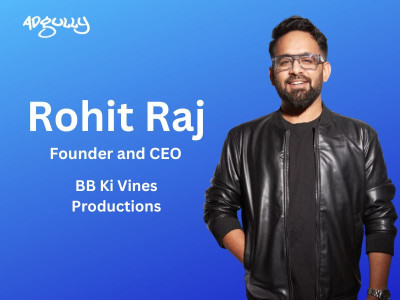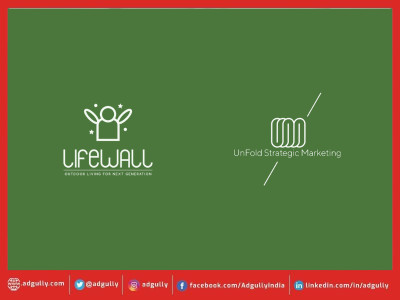Online food delivery is here to complement eating out, not replace it: Rohit Gawli
While the global pandemic has bought economies to a halt and massively disrupted businesses, it has also fuelled start-up dreams and we even saw several Indian start-ups achieve Unicorn status during the pandemic period. The times have never been better for the budding entrepreneurs to give wings to their start-up dreams.
The Government, too, has come up with various schemes to support its ‘Vocal for Local’ drive. A case in point is the recent Rs 1,000 crore Start-up India Seed Fund announced by Prime Minister Narendra Modi during the Start-up India International Summit 2021 held earlier this year.
Adgully is turning the spotlight on the entrepreneurs who fought against all odds to bring their dreams to fruition in our special series – START-UP STARS. We at Adgully wholeheartedly support the ‘Vocal for Local’ movement and over the next few months will be featuring all local/ homegrown businesses, brands and Apps.
In conversation with Adgully, Rohit Gawli, CEO and Co-Founder, Lokal Kitchen, speaks about how a challenging year like 2020 saw the birth of his entrepreneurial dreams in the form of Lokal Kitchen. No stranger to hyper-growth start-ups, Gawli speaks at length about growing his own business, while at the same time also addressing the social cause of empowering Indian women.
Please take us through your journey as an entrepreneur. What motivated you to establish your start-up? What were you doing prior to turning an entrepreneur?
I am a professional data engineer and have prior experience with multiple hyper-growth start-ups. I am also an Ex-TripAdvisor senior employee based out of Boston HQ. Through the course of my career, I have managed and developed scalable businesses, with deep understanding of the global technology market and enterprises’ growing digital needs. As Lokal Kitchen’s CEO, I actively provide consulting expertise to all my C-level executives on a regular basis regarding strategic decisions and new ideas.
The unprecedented turn of events witnessed in the year 2020 impacted economies and businesses gravely, however, I firmly believed that irrespective of the situation, the spirit of the people of this country is hard to dampen, especially those with entrepreneurial dreams. Keeping this in mind I teamed up with my childhood friend, Rohit Mhatre, and launched Lokal Kitchen. The Made-in-India food delivery application has a mission of enabling a start-up culture in every Indian household whilst making home chefs/ makers self-reliant. My company offers a wide range of regional and global cuisines to facilitate eating healthy, home-cooked meals. Moreover, when the pandemic hit, food delivery was the only option if you’d want to eat something different. But due to the scare of COVID-19, hygiene had become a norm. Making sure the food is cooked with care and in hygienic conditions was a priority. And we realised, such conditions exist only in your house, and barely in a restaurant kitchen, which makes home cooked food the perfect combination of health, hygiene, taste and tradition. We started experimenting by calling a few home chefs and marketing their food within friends and family, and they loved it. Besides, due the economic crisis, people needed an additional source of income, and food is something they cook on a daily basis, so why not cook extra and monetise it.
What need gap did you want to fulfil with your start-up? What is the core business proposition?
There’s a clear gap in the market related to home cooked food. Many people opt for dabbas/ tiffins on a weekly and monthly basis, and soon realise that it’s becoming monotonous. That’s where Lokal Kitchen comes in; we’re here to get you tiffins from a variety of home chefs – from Malvani to Bengali and 20+ other cuisines.
Our core business proposition is to spread the magic of home cooked food whilst addressing the social cause of empowering Indian women.
How did you identify your TG? Did you carry out any feasibility study prior to starting your business?
Attracting customers is critical to success – especially in the early stages of starting a business. We realised that people who are most likely to buy your products or services share certain characteristics. So, our first step was towards identifying these prospects while putting together a customer profile. We worked on a detailed description of our target demographic that included age, gender, location, etc. We then realised that our target audience is pretty much everyone who likes to eat healthy home cooked meals – from office goers to hostels, from traditional joint families to nuclear new age families – we wanted to tap into men and women across all generations (keeping millennials and Gen Z at the top). Understanding the market landscape helped us minimise the risk and allowed us to focus our brand marketing efforts in the most cost-effective way possible.
What were the challenges that you faced in your start-up journey and how did you overcome them?
The most difficult challenge that we face even today is market adoption. People are not used to ordering home cooked food on an app, and this is where we intend to ramp up our marketing efforts so that people know about Lokal Kitchen and its services. Ordering home cooked meal is a new concept and may take time to pick up. This challenge cannot be tackled by traditional coupons and promo codes giveaways, there is a dire need to educate people and make our home cooked food stand out compared to the food that’s being cooked in restaurant kitchens. A home cook takes pride and joy in hand selecting each ingredient and cooks food with personalised attention and care. This surely cannot be compared to a factory made packet of food lying on the isle of a department store for months.
What were the clearances that you required for your venture from various authorities?
Not much, the Government has simplified most of the processes, and to onboard our home chefs, we have only 2 major requirements – FSSAI license and delicious food.
Funds/ finance is the prime issue for almost all start-ups. What can the industry and the Government do to address this issue and ease the capital requirements of start-ups?
The Government can focus on reducing tax liabilities, especially the 18% GST on food delivery as a service. Besides, being a part of the third largest start-up ecosystem, the Government should also reduce the compliance burden, which in turn will improve the ease of doing business. A recent article I read revealed some statistics on how customers opting for food delivery at their home or office are paying 13% higher price on the same food and beverages compared to customers who are walking down to restaurants as the dine-in tax rate is 5%. I think it is time that this is changed as these high GST rates are harming the overall growth of our sector. The online food delivery sector in India has been growing by leaps and bounds, however, the tax complications arising due to the GST is likely to pose a roadblock to this growth. A reduction in GST rates will keep food costs affordable and create more jobs in the sector while furthering the Government’s initiatives.
Prime Minister Modi recently announced a Startup India Seed Fund. How do you see start-ups benefiting from it?
It’s a great initiative, but it is also too early to comment. It will take some time till the Indian start-ups and entrepreneurs actually start reaping benefits from this.
How is digital helping you further your business?
Well, for someone who’s coming from a Digital first world, I intend to focus on streamlining all our internal and external processes digitally, so that we can save on time and avoid errors. As a simple example, our chef contracts are sent and signed electronically. Adopting digital actually levels the playing field, providing small and medium enterprises like ours the chance to compete against the big boys and attract their share of targeted traffic.
What were your key learnings from 2020? How do you see the start-up ecosystem progressing in 2021?
2020 was a great year for learnings and appreciations. One thing I can surely say is, nothing can replace people going in the restaurants and eating their favourite food, as humans, you are compelled to get out of your boredom and indulge in outdoorsy activities, and online food delivery is here to complement it, not replace it. For 2021, we’re focusing on getting different culinary experiences to comfort of people’s homes.
What would be your message for the budding entrepreneurs?
Persistence beats all odds! – simple advice.
















Share
Facebook
YouTube
Tweet
Twitter
LinkedIn